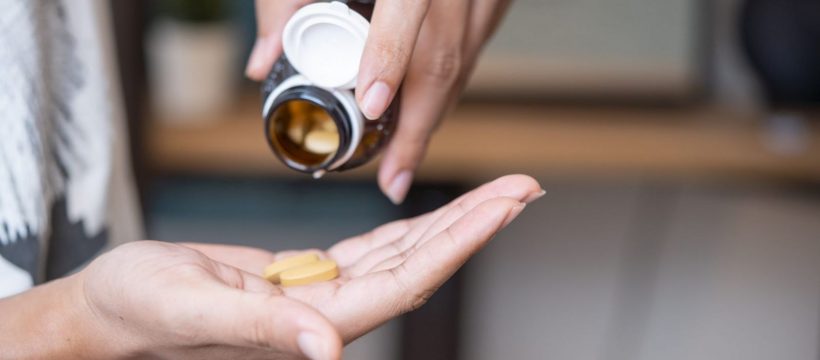Does taking vitamin D in the evening keep you awake? Is iron best absorbed in the morning? Will magnesium only help you sleep if you take it right before bedtime? We ask the experts whether we’re taking our supplements at the wrong time.
When you take a supplement, you want to make sure you’re getting the most out of it. Whether it’s taking iron to beat fatigue, omega-3 for brain health or magnesium to slip into a sound sleep, we often sling back vitamins and minerals without really thinking about how they get to work.
A few things go into how effective a supplement might be, but getting the timing right may be more important that you think. Take your pill, powder or spray at an inopportune moment and, at best, it might not be absorbed; at worst, you could well spend the evening staring at the ceiling, unable to drift off.
We’ve been asking the nutritional experts to explain the importance of timing for supplement efficacy. Here’s what to take and when.
You may also like
5-HTP and magnesium: are these supplements the key to better sleep and mood?
Vitamin D
Your body needs vitamin D for optimal bone and muscle health, as well as good immune function.
A high-quality vitamin D supplement is a daily staple during autumn and winter – or year-round for those of us with darker skin tones. Vitamin D is sometimes known as the ‘sunshine vitamin’ because our bodies make it when we’re exposed to the sun’s UV rays.
Some food sources contain vitamin D, including oily fish, eggs and fortified products – but it’s difficult to get enough from food alone, which is where supplements come in.

The best time to take a vitamin D supplement
Alex Glover, senior nutritionist at Holland & Barrett, explains: “It makes sense to take vitamin D in the morning due to the effects of vitamin D on the physiological processes involved in wakefulness.”
There are some theories kicking around the internet that say taking vitamin D in the evening can disrupt your sleep. However, there isn’t any research that directly supports this idea.
“If you can, take it in the morning, but I wouldn’t be too stressed about when to take it, as taking it full stop is more important.”
Vitamin D is a fat-soluble vitamin, so whatever time you take it, have it with food containing some fat to ensure optimal absorption.
Iron
The symptoms of iron deficiency can be frustrating to deal with, especially when you’re working out. From constant fatigue to muscle weakness and a raised heart rate, it can often feel like you’re not making any fitness progress at all.
But getting your levels checked by your GP and taking supplements can be a game changer if your iron levels are low or if you have iron deficiency anaemia.
The best time to take an iron supplement
In a 2020 study of iron deficient athletes, researchers found that the best time to take iron was within 30 minutes of morning exercise. The study found that morning exercise opened up a short-term window where iron was best absorbed.
If you’re not one for an AM sweat session, though, when’s the best time to take your iron?
“Iron supplements are best absorbed on an empty stomach, taken an hour before food,” says Clare Thornton-Wood, registered dietitian and member of the British Dietetics Association. “However, sometimes iron supplements upset your stomach, and if this is the case then take just after a meal.”

Some foods and drinks, such as coffee, tea and calcium-rich products, interfere with iron absorption. The NHS recommends leaving a two-hour gap between taking your supplement and having coffee, tea or calcium.
If you’re like me and have a cup of coffee or tea at-hand all morning, then the second half of the day is your best bet for optimal iron absorption (remember to take it with a source of vitamin C too).
“Unless this upsets your digestion and leads to trouble sleeping, then iron is fine to take in the evening,” Glover says.
Magnesium
Your body loves magnesium and uses it to support brain, heart and muscle function. There is also a link between the mineral and improved sleep, as well as a reduction in stress and anxiety.
“Ideally you should obtain enough magnesium from food sources including avocado, nuts, seeds, legumes, dark chocolate and wholegrains,” Thornton-Wood says. “If you take a supplement, then do not exceed the RNI 270mg a day for women (19 to 64 years).”
Taking more than 400mg a day can cause diarrhoea.
You may also like
Period pains: can magnesium supplements ease menstrual cramps?
The best time to take a magnesium supplement
If you are taking a magnesium supplement with the purpose of improved sleep, do you need to take it before bedtime?
“There is some evidence suggesting magnesium supplementation in the evening may have a modest effect on improving sleep quality,” Glover says.
But both Glover and Thornton-Wood agree that the supplement will be effective at any time you take it. Glover adds: “Like with vitamin D, focusing on making sure your magnesium levels remain in the healthy range is more important than the time of day you decide to take it.”
Omega-3
There is plenty of research backing the positive health effects of regular omega-3 intake. The fatty acid can reduce inflammation in your body and aid your cognitive function. Omega-3 fatty acid has also been linked to lower anxiety levels and a reduced risk of cardiovascular disease.
The best time to take an omega-3 supplement
You might already be taking a fish oil or algae supplement, especially if you’re vegan, vegetarian or just don’t fancy much fish.
With this supplement, it doesn’t matter what time of the day you take it. But Thornton-Wood advises taking your omega-3 supplement – which is fat-soluble – with a meal for best absorption.
B vitamins
When we talk about B vitamins, we’re usually talking about a group of eight water-soluble vitamins that lend a hand to a range of functions in your body. If you eat a healthy and varied diet with plenty of plants, you’re likely getting enough B vitamins and don’t need a supplement.
The exception to this rule is if you’re pregnant or planning to become pregnant, in which case you may want to take a folic acid (B9) supplement. And if you’re vegan, you may need to take a B12 supplement. As always, it’s best to talk to your GP before you start taking a supplement.
The best time to take a B vitamin supplement
One of the roles of B vitamins in your body is to help the food you eat become energy for you to burn. Because of this, Thornton-Wood advises taking your supplement first thing in the morning. And because they’re water-soluble vitamins, you can take them on an empty stomach.
Images: Getty
Source: Read Full Article
